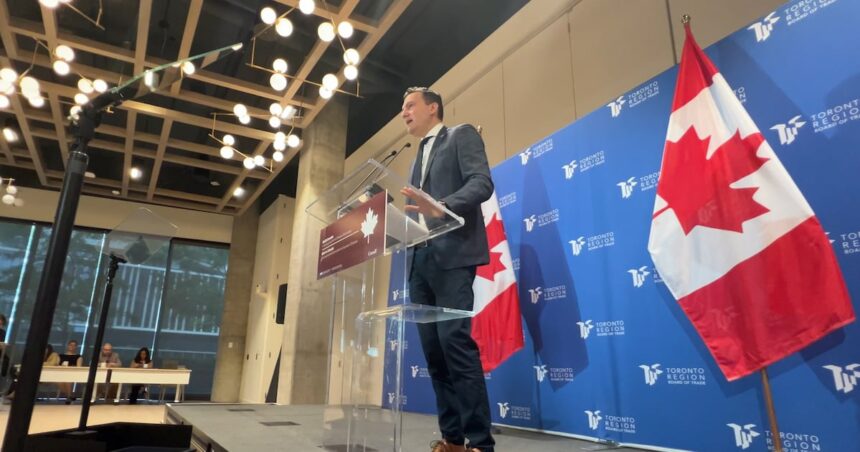As Toronto Tech Week winds down its fifth annual gathering, attendees are abuzz with contradictory signals: record venture funding flowing into Canadian AI startups alongside growing concerns about sophisticated AI-enabled fraud that threatens both businesses and consumers.
The weeklong conference, which drew over 25,000 attendees to various venues across downtown Toronto, served as both a celebration of Canada’s maturing tech ecosystem and a sobering reminder of technology’s dual-use nature.
“We’re seeing unprecedented growth in our AI sector – $1.8 billion in funding just in the first half of 2025,” noted Raquel Urtasun, CEO of self-driving technology company Waabi, during her keynote. “But with that growth comes responsibility to address the less savory applications of these same tools.”
Those less savory applications were front and center during several packed security panels. The Canadian Anti-Fraud Centre reported last month that AI-assisted scams have increased 340% year-over-year, with losses topping $290 million in 2024 alone.
“What’s particularly troubling is how quickly criminals adapt,” explained Daniel Therrien, former Privacy Commissioner of Canada, during a panel on digital trust. “The same large language models powering customer service bots are being repurposed to create convincing phishing campaigns that can mimic your boss, your bank, or government agencies with frightening accuracy.”
Several cybersecurity firms demonstrated how voice cloning technology, now available for as little as $50 a month on subscription services, can bypass voice authentication systems at financial institutions. In one live demo that left the audience visibly uncomfortable, a security researcher generated a synthetic voice identical to the moderator’s after analyzing just three minutes of speech.
“The technology to create this kind of fraud is democratizing faster than our defenses,” warned Claudette McGowan, founder of Protexxa, a Toronto-based cybersecurity firm. “We’re seeing a significant gap between corporate awareness and actual security implementations.”
That implementation gap was quantified in a report released during the conference by the Canadian Centre for Cyber Security, which found that while 84% of business leaders expressed concern about AI-powered threats, only 29% had updated their security protocols to address them.
The economic stakes couldn’t be higher for Canada’s tech sector. According to figures from Statistics Canada, the information technology sector now accounts for nearly 5.8% of Canada’s GDP, employing over 715,000 people nationwide. Toronto alone hosts more than 18,000 tech companies.
For Canadian banks and financial services firms, which had a major presence at the conference, the tension between innovation and security was palpable. Royal Bank of Canada showcased its new AI-driven investment advisory system while simultaneously announcing enhanced fraud detection capabilities.
“We’re in an arms race,” acknowledged Laurie Pezzente, RBC’s Chief Security Officer. “We’re using AI to detect the fraud that’s increasingly being perpetrated using AI. It’s a continuous cycle of adaptation.”
Beyond fraud concerns, Toronto Tech Week highlighted the growth challenges facing Canadian startups. Despite record funding, Canadian tech firms still struggle with talent retention compared to American competitors.
“We’ve seen a 22% increase in repatriation of Canadian tech talent from Silicon Valley in the past 18 months,” said Abdullah Snobar, Executive Director of the DMZ tech accelerator. “But we’re still losing too many senior engineers to U.S. firms that can offer compensation packages 30-40% higher than Canadian companies.”
That talent crunch was evident at the conference’s career fair, where 127 companies competed fiercely for AI engineers, data scientists, and cybersecurity specialists.
Several government representatives used the conference to highlight new initiatives designed to strengthen Canada’s competitive position. The federal government announced an additional $300 million for the Strategic Innovation Fund specifically earmarked for AI startups, while Ontario unveiled tax incentives for companies developing AI safety mechanisms.
“We understand that fostering innovation while ensuring protection against misuse requires a balanced approach,” said François-Philippe Champagne, Minister of Innovation, Science and Industry, who attended the conference’s opening ceremonies.
For smaller companies like Toronto-based fraud prevention startup Trulioo, the convergence of AI innovation and fraud presents both challenge and opportunity.
“We’re helping companies implement multi-layered verification that goes beyond traditional passwords or knowledge-based authentication,” explained Trulioo’s CEO Steve Munford. “The most effective defense combines biometrics, behavior analysis, and contextual authentication—all powered by AI that can spot anomalies humans might miss.”
As Toronto Tech Week concluded with its traditional startup pitch competition (won by Montréal-based Cyberex, which offers AI-powered deepfake detection), the dual narrative of opportunity and risk remained front and center.
“What we’re witnessing is a technological inflection point,” reflected MaRS Discovery District CEO Yung Wu during the closing panel. “Canada has positioned itself as a leader in responsible AI development, but that leadership will be tested by how effectively we balance innovation with protection of individuals and institutions from increasingly sophisticated threats.”
For the ordinary Canadians outside the conference halls, the message was clear: the AI revolution transforming Toronto’s skyline with new tech headquarters brings both economic opportunity and new forms of risk that will require vigilance from individuals, businesses, and regulatory bodies alike.






